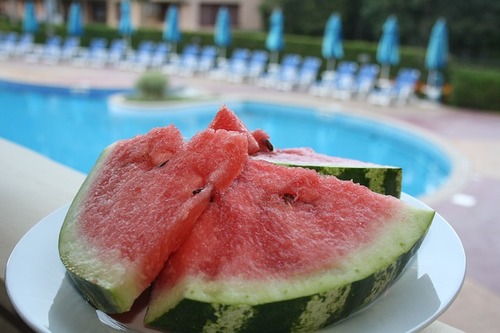Are Watermelons Bad For You?
Short answer
Watermelon is great for you, providing the body with several essential nutrients while keeping you hydrated. Excessive amounts of sugar and lycopene may be problematic, so limit your intake to a few cups per day.
Very healthy and numerous health benefits. A few harmful qualities may be associated, but only under certain circumstances such as an allergic reaction.
View Full Grading System
Category 'A'
Very healthy and numerous health benefits. Side effects are rare. Things rated an 'A+' are typically necessary for survival (for example, water).
Very healthy and numerous health benefits. A few harmful qualities may be associated, but only under certain circumstances such as an allergic reaction.
Very healthy and numerous health benefits. Harmful qualities may be associated, but aren't usually serious.
It is important to note that even the best things in life can become bad in immoderate amounts. So, although something may be rated an 'A+', overconsumption/overdoing can bring unwanted effects.
Category 'B'
Very beneficial to your health. Things rated a 'B+' may have a few harmful qualities to pay attention to.
Overall beneficial to your health. Things rated a 'B' may have some harmful qualities to pay attention to.
More beneficial to your health than not. However, harmful qualities are most likely associated and shouldn't be overlooked.
The main difference between category 'A' and category 'B' is the harmful qualities typically present in 'B' items. Serious side effects are usually uncommon, but are still possible and should be taken note of.
Category 'C'
Both beneficial and harmful qualities associated. Things rated a 'C+' are typically a bit more on the beneficial side. Still, moderation is important.
A fairly even ratio of beneficial and harmful qualities. Moderation is important. Very general topics that can lean towards both sides of the spectrum will be placed here as well. Rice, for example, can be good or bad depending on the type.
More harmful than beneficial. Side effects are common, especially when consumed/done excessively. Moderation is very important.
Category 'C' usually denotes to both good and bad qualities. When it comes to this category, it is important to keep this word in mind: moderation.
Category 'D'
Harmful to your health. Although benefits may be associated, the bad most likely outweighs the good. Moderation is very important.
Harmful to your health. A few benefits may be associated, but the bad outweighs the good. Moderation is extremely important.
Harmful to your health. Very few, if any, benefits are present. Things in this category should be avoided as much as possible.
Category 'D' is typically for things that are more harmful than beneficial. While consuming/doing something unhealthy once in a blue moon shouldn't hurt, we definitely recommend eliminating 'D' items as a regular part of your routine/diet.
Category 'F'
Category 'F' is for things that fail to bring anything beneficial to the table, and are very harmful to your health. We recommend completely avoiding anything in this category. Long-term side effects of 'F' items are usually very serious.
Category 'N'
'N' stands for neutral. Things placed into this category are generally (a) neither good nor bad for you, or (b) lack the necessary evidence to reach any conclusions.
Long answer
Watermelon, a fruit related to cucumbers and pumpkins, is a great source of many nutrients, especially the carotenoid, lycopene. Lycopene, which gives tomatoes, guavas, and watermelon their characteristic red color, is one of the most powerful antioxidants. It helps our bodies in a variety of ways, such as preventing prostate cancer and improving blood circulation, in addition to fighting free radicals that may cause harm to the body.
Watermelons are also beneficial in several other ways. Watermelon is approximately 92% water, which means it can be a great source of hydration and excellent in preventing heat stroke. Watermelons are low in calories, contain no fat or sodium, and are packed with vitamin C, vitamin A, pantothenic acid, copper, and potassium. While the rind is edible (the first cookbook published in America in 1796 has a recipe for pickled watermelon rinds), it is usually not eaten. Other than lycopene, one of the best things about watermelon is that it contains an amino acid called citrulline. Citrulline is converted by the body into arginine. Both amino acids are essential for improved blood flow and cardiovascular health. Some research even indicates that citrulline can help prevent or combat erectile dysfunction.
Despite its health benefits, the watermelon does pose a few slight risks. First, watermelon has a relatively high amount of sugar, containing 10 grams per cup. Even though this is natural sugar, too much can still be problematic. Also, due to its potassium content, people with hyperkalemia should limit themselves to no more than one cup of watermelon per day. Lycopene in amounts of over 30 mg per day has been shown to possibly lead to nausea, bloating, indigestion, and diarrhea, so we don't suggest eating exclusively watermelon or other lycopene-rich foods.
Possible short-term side effects
- nausea
-
bloating
-
indigestion
-
diarrhea
Possible long-term side effects
Ingredients to be aware of
Benefits
- promotes cardiovascular health
-
keeps you hydrated
-
improves the immune system
-
may help prevent / combat erectile dysfunction
-
may improve bone health
-
may prevent various forms of cancer
Please turn your Ad Blocker off to see this content. Thank you!
Thank you for your feedback!
Written by Jeff Volling
Published on: 02-08-2016
Last updated: 12-10-2016
Thank you for your feedback!
Written by Jeff Volling
Published on: 02-08-2016
Last updated: 12-10-2016

 Approved by
Approved by 















